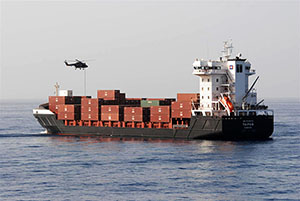Maritime piracy: the special cases of the Gulf of Guinea and the Gulf of Aden
Maritime piracy in the Gulf of Guinea
 Long confined to the shores of the Horn of Africa, with instability in Yemen and Somalia in particular, maritime piracy now seems to be taking root in the Gulf of Guinea, which has become a danger zone. According to the IMB, acts of piracy are on the rise in this part of the world, an essential passage for many commercial vessels. Two recent incidents illustrate this situation:
Long confined to the shores of the Horn of Africa, with instability in Yemen and Somalia in particular, maritime piracy now seems to be taking root in the Gulf of Guinea, which has become a danger zone. According to the IMB, acts of piracy are on the rise in this part of the world, an essential passage for many commercial vessels. Two recent incidents illustrate this situation:
- at the end of March 2023, pirates seized a Danish oil tanker off the coast of Congo, kidnapping six crew members before abandoning the vessel,
- in April 2023, a tanker sailing in the Gulf of Guinea was seized by unidentified elements some 550 km off Côte d'Ivoire.
Maritime piracy in the Gulf of Aden
Ships transiting the Gulf of Aden are also prey for pirates, mainly from Somalia. This route, which supplies major energy-consuming countries, accounts for 40% of the world's maritime traffic.
To counter the risk of piracy, the international community is organizing the security of the ships that navigate it. Three naval coalitions, set up by the European Union, NATO and the United States, keep a watchful eye on ships using this maritime route. Other countries such as China, India, Russia and Japan have also joined these initiatives.
Every year, some 2000 ships flying the Japanese flag pass through the Bab El Mandeb Strait, which separates Djibouti and Yemen and links the Red Sea to the Gulf of Aden. In 2009, the Japanese government decided to deploy ships in the Indian Ocean, and since 2011, Japan has had military facilities in Djibouti. The troops deployed in the Gulf of Aden and Djibouti are the Japanese Self-Defense Forces (SDF).
To further strengthen this international coordination, Japan has taken part since 2013 in Combined Task Force 151 (CTF-151), a joint intervention force bringing together several nations tasked with carrying out defense operations in the area assigned to them.
It is also worth noting that 99% of Japan's international trade depends on marine transport, hence the importance of maritime security for the economy of the Levantine country. The Gulf of Aden, which links Asia to Europe via the Suez Canal, is therefore a vital sea route for Japan.
More recent data from the Japanese government's Annual Report 2022 of March 2023 "Japan's Actions against Piracy off the Coast of Somalia and in the Gulf of Aden" show that around 17% of container ships worldwide and 18% of vehicles exported by Japan transited the Gulf of Aden during the year.
Read also | Marine insurance: liability and risks covered